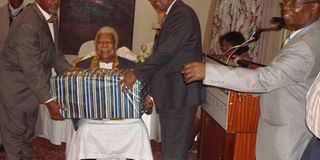Why do Kenyans continue to shun and ignore some of its best brains?

The late Prof Ali Mazrui (centre). PHOTO | FILE
What you need to know:
- I will forever recall Dr Mosonik arap Korir, that rare historian, who made it a point in his First Year history class to share some of the illuminating anecdotes about intellectuals. He introduced us to Prof Mazrui in 1990.
I was too young to be taught by Prof Ali Mazrui. In fact, I feel a little envious reading the many interesting reflections of those who knew him personally and especially those whom he taught. The one thing that is a fact is that though Prof Mazrui was Kenyan by birth, Kenya does not deserve him.
His great contribution to knowledge will never be substantively associated with Kenya beyond the repeated description of him as a Kenyan-born political scientist. We are lucky to have his body and to own it forever.
But we certainly do not deserve his ideas; for most of these ideas were generated outside any active interaction with any Kenyan institution of higher learning.
There are many interesting anecdotes about Prof Mazrui’s life that have been told, but many more that are yet to be told. And it is in these anecdotes that I got the greatest inspiration about Prof Mazrui.
I will forever recall Dr Mosonik arap Korir, that rare historian, who made it a point in his First Year history class to share some of the illuminating anecdotes about intellectuals. He introduced us to Prof Mazrui in 1990.
Few know the fact that Prof Mazrui did not qualify for admission into Makerere University after his secondary school. Even fewer know that he had one of the speediest promotion to professorship at Makerere University.
Here, in this story, is the connection that brought Prof Mazrui in contact with Prof James Coleman and further entrenched his association with Colin Leys.
It is said that Prof Coleman was asked to review an article for American Political Science Review. This is a journal with a high rejection rate of submitted articles.
Coleman easily recommended the publication of the piece, only to learn later it was authored by a graduate student in the name of Ali Mazrui.
His curiosity led him to find out who this student was and finally into a lifelong friendship and interaction.
In his inaugural lecture after his promotion to professor, Mazrui is cited as having confirmed regarding his promotion that it seemed at that point as if Makerere University was apologising to him personally for not having admitted him earlier.
To date, Makerere University seems to continue to apologise to Prof Mazrui.
I only met Prof Mazrui twice in my life — once at a conference at a university in Erie and another during the Codesria 30th Anniversary celebration in Dakar. I recall that Prof Maurice Amutabi, the deputy vice-chancellor of Kisii University, also attended the conference. I was making a presentation on Conflict in Somalia and Crime in Nairobi. Prof Mazrui was the keynote speaker.
As I was making my presentation, he walked in to listen to the presentations. I made the claim in my presentation that Kenya has been more hostile to Somali refugees in Kenya compared to Ugandan ones.
The usual response from senior academics would have been to dismiss and, if possible, put me in my place.
Prof Mazrui disagreed with my claim, but did not intervene then. He later on gave his keynote address in the evening making positive reference to my presentation. Since we were staying at the same hotel, we rode in the same van together with Prof Amutabi back into town.
He gently reminded me of the claim and suggested that I was underestimating the hostility of Kenya towards Uganda refugees.
He went back to Binghamton and took the time to send me a long email on this point. He gave me several reasons for his argument and suggested to me that I speak to a number of Ugandans who experienced the situation. He even collected and sent me their email addresses.
This was Prof Mazrui’s enduring impact on me, and many other young Africans whose presence he appreciated.
Godwin Murunga is senior research fellow, Institute for Development Studies, University of Nairobi. [email protected]





